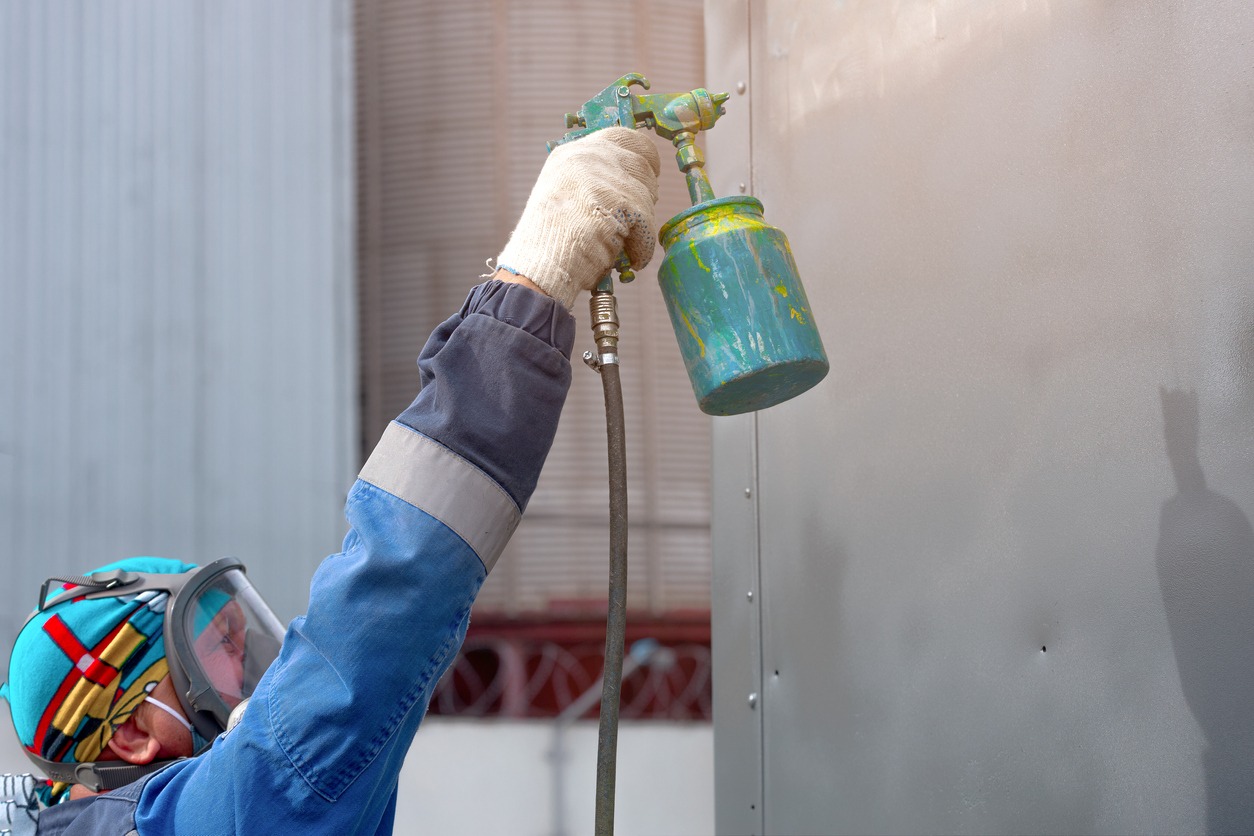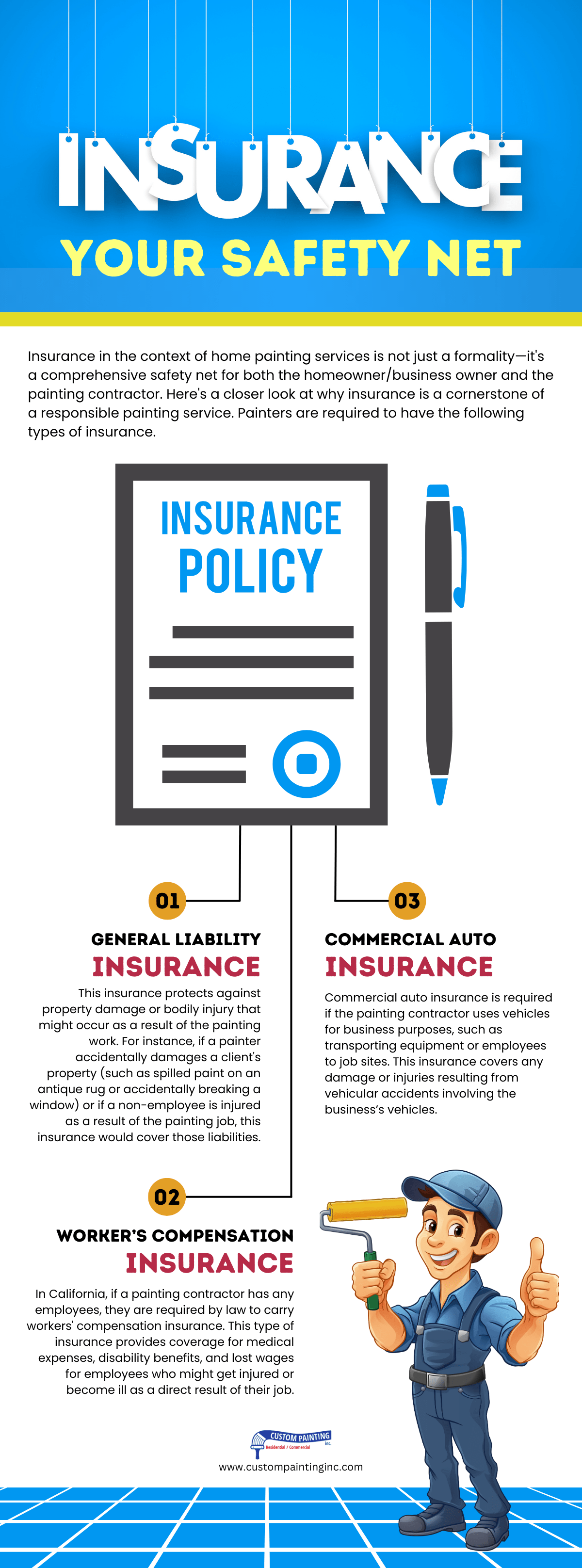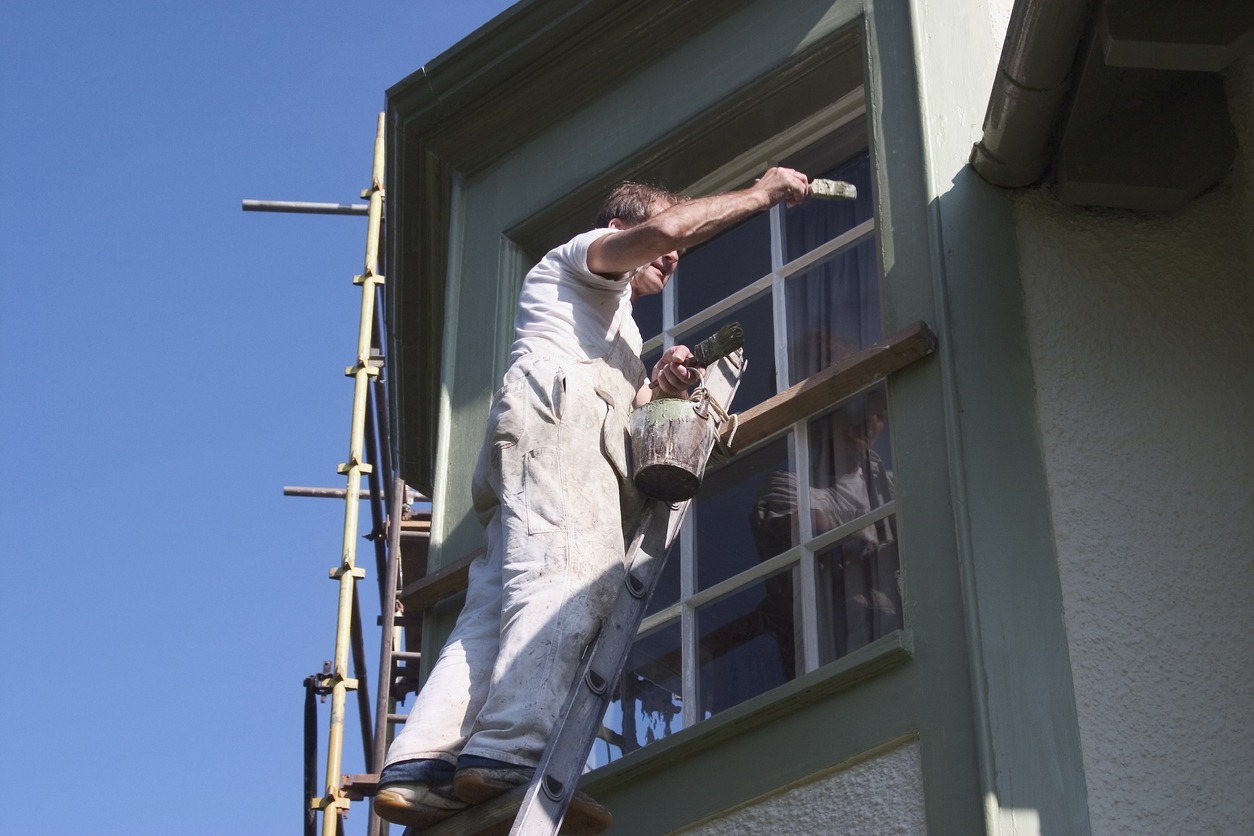As a homeowner or manager of a business, when you decide to embark on a painting project, you’re not just changing the color of your walls but entrusting your home or your business aesthetic and integrity to someone else. That’s why choosing the right painter in the Bay Area is crucial. This article will explain why opting for licensed, insured, and bonded painters is not just a wise choice but a necessary one.
The Importance of Licensing
One of the most important things to consider when planning a painting project is choosing a licensed painting company to do the painting. In the state of California, all painting contractors are required to be licensed by the California State Licensing Board (CSLB). The organization ensures that all licensed contractors meet the state’s standards for professionalism and competency.
To qualify for a license, painters must have a minimum of four years of journey-level experience, pass a law and business examination as well as a trade examination, and undergo a criminal background check. When completing the licensing process, state regulators will be able to determine that the painter has the skills needed and the desire to be a quality painter their clients can trust.
There are two types of licenses for painters:
- C-33 Painting and Decorating License: This is the specific license category for painters in California. Holding a C-33 license means the painter is legally authorized to perform painting and decorating work within the state.
- Specialty Licenses: Some painters might also hold specialty licenses for particular types of work, such as lead paint removal, which requires additional certification.
However, licensing is more than just a credential for painters. When it comes to painting your home, the importance of hiring a licensed painter cannot be overstated. A license is much more than just a piece of paper or a bureaucratic requirement; it’s a hallmark of professionalism and expertise. Here’s why:
Obtaining a license is not a mere formality. Painters undergo rigorous testing and evaluation to obtain their licenses. This process ensures that they have the necessary skill set, understand the latest painting techniques, and are familiar with the variety of materials and products available on the market. As a homeowner or business owner, when you hire a licensed painter, you’re hiring someone whose expertise is recognized and verified by professional bodies.
Industry standards and ethical codes bind licensed painters. They are expected to deliver services that meet or exceed these standards. This adherence is not just about ensuring a visually pleasing outcome; it’s also about ensuring that the work is durable, safe, and done in a manner that respects your property and its occupants.
Painting and related services are constantly evolving, with new products, technologies, and methods emerging regularly. Licensed painters are required to keep up with these changes, ensuring they can offer you the latest and most effective solutions. Whether it’s eco-friendly paints or advanced application techniques, a licensed painter brings a level of current knowledge that unlicensed individuals may not.
Many painting projects, especially those that involve significant changes or work on historic properties, may require permits and need to comply with local building codes. Licensed painters are well-versed in navigating these requirements, ensuring that your project is beautiful and legally compliant. Unlicensed painters may not know about the local building codes or may not comply with them.
Occasionally, something will go wrong during a painting project. If that happens, a license provides a pathway for recourse. Licensed painters are accountable to regulatory boards, and as a homeowner or business owner, you have the ability to file a complaint or seek remediation if the work does not meet the agreed-upon standards. This level of accountability is often lacking with unlicensed painters.
Having and maintaining a license is one of the cornerstones of a painter’s professionalism. It’s a testament to their skill, adherence to standards, knowledge of current trends, and their commitment to legal compliance and accountability. As a home or business owner, choosing a licensed painter means making an informed decision to protect your investment and ensure the highest quality outcome for your painting project.
Insurance: Your Safety Net
The second most important thing a painting contractor in the Bay Area should have is insurance coverage. Painters understand that a home is a major investment and a large financial commitment. Along with requiring a license, the CSLB also requires painting contractors to have insurance to protect both the painter and the client.
Accidents can happen, and in the world of home improvement, they can be costly. Insured painters carry liability insurance to protect your property from any damage. Additionally, they carry worker’s compensation insurance to cover the painters themselves, ensuring that you are not held liable for any injuries that might occur on your property.
Insurance in the context of home painting services is not just a formality—it’s a comprehensive safety net for both the homeowner/business owner and the painting contractor. Here’s a closer look at why insurance is a cornerstone of a responsible painting service. Painters are required to have the following types of insurance.
1. General Liability Insurance
This insurance protects against property damage or bodily injury that might occur as a result of the painting work. For instance, if a painter accidentally damages a client’s property (such as spilled paint on an antique rug or accidentally breaking a window) or if a non-employee is injured as a result of the painting job, this insurance would cover those liabilities. It typically includes protection against personal injury, property damage, and advertising injury claims.
Knowing that your painter has liability insurance can give you the assurance that they are professionals who take their responsibility to protect your property seriously.
2. Workers’ Compensation Insurance
In California, if a painting contractor has any employees, they are required by law to carry workers’ compensation insurance. This type of insurance provides coverage for medical expenses, disability benefits, and lost wages for employees who might get injured or become ill as a direct result of their job.
3. Commercial Auto Insurance
Commercial auto insurance is required if the painting contractor uses vehicles for business purposes, such as transporting equipment or employees to job sites. This insurance covers any damage or injuries resulting from vehicular accidents involving the business’s vehicles.
Painters who have these three types of insurance are those who are also committed to delivering high-quality work. They tend to be more careful, conscientious, and detail-oriented in their work. These painters also want to build long-term relationships with clients based on trust and quality service. This can be particularly beneficial if you plan to have ongoing or future projects.
It is important for you to verify that the painter’s insurance is current and provides adequate coverage for the scope of the project. Be sure to ask for a Certificate of Insurance (COI), which provides details of their insurance coverage. This document will give you a clear picture of the protections in place. Hiring insured painters means prioritizing the safety, security, and quality of your painting project.
The Security of Bonding
Along with licensing and insurance, the CSLB also requires that painting contractors be bonded. Bonding is your assurance that you’re working with a reliable professional. A bonded painter provides a financial guarantee to their clients. In the unlikely event of a job not being completed as per the agreement or if there are issues with the work quality, the bond can be used to compensate you. It’s an added layer of protection for your investment.
Bonding is a crucial aspect often overlooked in the hiring process of a painting contractor. Yet, it plays a pivotal role in providing security and peace of mind to homeowners and business owners alike. Let’s delve deeper into why bonding is so important:
A bond is a form of financial assurance that a painting contractor will fulfill their contractual obligations. It’s a three-party agreement between the homeowner or business owner (the obligee), the contractor (the principal), and the bonding company (the surety). If a contractor fails to complete a project as agreed or delivers subpar work, the bond can compensate the property owner financially. This is particularly important in scenarios where rectifying poor workmanship or unfinished work would incur additional costs.
There are two types of bonds relevant to painting contractors.
- Performance Bonds: This type of bond ensures the completion of the project to the standards and timeline specified in the contract.
- Payment Bonds: This type of bond is a guarantee that the contractor will pay for services and materials from suppliers and subcontractors, protecting home and business owners from liens against their property.
Reasons to choose a bonded painter:
A bonded painter is seen as more trustworthy. The fact that a bonding company is willing to vouch for them indicates a level of professionalism and reliability.
A bonded painter is seen as being credible with bonding companies. To get bonded, painters must undergo a thorough screening process by bonding companies, which assesses their financial stability and track record. This vetting process adds an extra layer of assurance for the property owner.
A bond also offers property owners protection against financial loss. The bond can be viewed as a safety net, ensuring the owners are not out of pocket if a contractor doesn’t fulfill their obligations. And, if disputes do occur regarding the quality of work or contractual non-compliance, the bond offers a straightforward mechanism for resolution, often without the need for lengthy and expensive legal processes.
Painting contractors who invest in bonding are committed to their trade and business practices. It indicates they are thinking about the long-term aspects of their business and client relationships. Bonded painters often maintain higher standards of work, knowing that their bond—and, by extension, their reputation and financial standing—is on the line.
As the home or business owner hiring a painting contractor, it is your responsibility to ask to see the bond certificate so you can confirm its validity. You can visit the CSLB website to confirm the bond certificate is valid. You will want to ensure that the bond covers the type of work and the potential value of claims that could arise from the project.
In conclusion, bonding provides property owners with a significant financial and quality assurance layer. It offers protection against financial loss and substandard work and indicates a painting contractor’s professionalism and commitment to ethical business practices. When selecting a painting contractor, considering their bonded status is a wise step in ensuring a secure and satisfactory painting project for your home.
Quality and Compliance
Licensed painters are required to adhere to strict industry standards and local building codes. This adherence ensures high-quality work that looks good and is safe and durable.
When it comes to painting projects, quality, and compliance are not just about the final aesthetic appeal but also about the work’s longevity, safety, and legal adherence; as a professional painting contractor, it is vital to emphasize how crucial these aspects are:
- Adherence to Quality Standards: Licensed and professional painters are committed to delivering superior craftsmanship. This commitment encompasses meticulous surface preparation, precise application, and choosing the right materials for each job.
- Attention to Detail: Quality in painting involves attention to detail that goes beyond just applying paint. It includes thorough clean-up, ensuring even coatings, sharp lines, and smooth finishes without drips or streaks.
- Use of High-Quality Materials: High-quality paints and materials have better durability, which means they last longer and maintain their appearance over time, resisting fading, cracking, or peeling. Professional painters prioritize the use of materials that are safe for both the environment and the occupants of the home or business, such as low-VOC (Volatile Organic Compounds) paints.
- Compliance with Building Codes and Regulations: Painting contractors must comply with state and local building codes and regulations. This adherence is crucial for passing inspections and avoiding legal issues, particularly in commercial or public spaces. Professionals ensure that all necessary permits are obtained and that their work is covered by appropriate insurance, further protecting homeowners and business owners.
- Continuous Training and Up-to-date Techniques: The painting industry continually evolves with new technologies and methods. A professional painter invests in ongoing training and stays current with the latest techniques and trends, bringing the best of these innovations to your project. This up-to-date knowledge allows painters to work more efficiently and effectively, often translating into faster completion times and less disruption to your home or business.
- Ensuring Satisfaction and Safety: A major part of quality and compliance is ensuring client satisfaction. This includes clear communication, understanding client needs, and delivering on expectations. Professional painters prioritize safety, adhering to the standards of OSHA (Occupational Safety and Health Administration). This includes proper scaffolding, using safety gear, and ensuring the site is safe for workers and inhabitants.
- Guarantees and Warranties: Many professional painters offer guarantees or warranties on their work, providing clients with peace of mind that any issues will be rectified post-completion. During your interview, before hiring a painting company, ask them about their warranty if they do not offer the information.
In conclusion, quality and compliance are fundamental to professional painting services. They ensure an aesthetically pleasing result and a durable, safe, and legally compliant project. For homeowners and business owners, choosing a painting contractor who prioritizes these aspects is essential for a successful painting project.
Long-Term Cost-Effectiveness
When considering a painting project for your home or business, looking beyond the initial cost and understanding the long-term cost-effectiveness of hiring professional, licensed, insured, and bonded painters is essential. Here’s a deeper dive into why this approach is more economically beneficial in the long run.
Professional painters use high-quality paints and materials that are more durable and less prone to issues like chipping, cracking, or fading. This means your paint job will last longer, reducing the frequency and costs of repainting.
A crucial step often overlooked by amateurs is surface preparation. Professionals ensure surfaces are properly cleaned, repaired, and primed before they start a painting project. Prepped surfaces are the key to the longevity of the paint job. Of course, priming is not always needed, but a professional painter will let you know if it is needed or not.
A professional painting company knows how to avoid costly mistakes. They understand fixing painting errors can be expensive, especially if it involves rectifying damage to other parts of your property. But, should an accident occur, the painter’s insurance covers damages, saving homeowners and business owners from unexpected expenses.
Professional painters know that certain types of paint can contribute to energy efficiency by reflecting light and heat, leading to potential savings in heating and cooling costs. They also know about paints designed for use in high-humidity environments and paints with other specialty features to protect your home.
Notably, a well-executed paint job can significantly enhance a property’s curb appeal and market value, which is a crucial consideration for property owners. With a professional paint job, the need for touch-ups and maintenance can also be significantly reduced. This decreases the overall cost and hassle of keeping your property looking its best.
You can expect a professional painting company to offer detailed quotations prior to beginning any painting project. This quotation helps homeowners and business owners understand the full scope and cost of the project upfront, avoiding hidden costs and budget overruns. It also allows the home or business owner to ask questions, clarify any misunderstandings, and change their requirements before the job starts.
While the upfront cost of hiring professional, licensed, insured, and bonded painters may be higher compared to DIY or unlicensed options, the long-term savings, durability, and added value they bring make it a wise investment. This approach ensures a beautiful and lasting finish and aligns with a prudent financial strategy for maintaining and enhancing your property.
Why You Want to Choose a Licensed Painter versus a Non-Licensed Painter
For Homeowners
Your home is more than just a building; it’s a personal space that reflects your style and provides comfort to you and your family. Ensuring that any improvements to it, like painting, are made with the utmost care and professionalism is essential. By choosing licensed, insured, and bonded painters, you’re not just hiring someone to paint your walls but investing in peace of mind, quality, and the longevity of your home’s beauty.
When hiring a painter as a homeowner, it’s important to approach the process with diligence and care to ensure you get the best quality work for your investment. Start by asking for recommendations from friends, family, or trusted online platforms to find reliable and experienced painters in your area. Once you have a list of at least three potential candidates, check their credentials thoroughly. Confirm they are licensed, insured, and bonded, especially if you live in a state like California, where such requirements are strictly enforced. This guarantees their legitimacy and protects you from potential liabilities and substandard work.
It is also equally critical that you take the time to interview each candidate. Discuss your project in detail, covering aspects like the type of paint, color choices, number of coats, and time frame for completion. A good painter will listen to your requirements and provide valuable suggestions based on their expertise. You will also want to ask each candidate for detailed quotes and compare them to understand what each painter offers for the price. Don’t forget to check their references and previous work, which can give you a clear idea of their skill and reliability. Ultimately, the right painter should combine quality workmanship with a professional attitude and answer any questions you have, ensuring your painting project is smoothly and efficiently completed to your satisfaction.
For Business Owners
For business owners, your property is where you do your business or provide customer services. You know the exterior of your property can draw in potential customers or possibly drive them away, so hiring a licensed, bonded, and insured painter will ensure your business exterior and interior are visually appealing and appropriate.
As a business owner looking to hire a painter, the approach requires a blend of professional insight and a keen eye for quality. First and foremost, the painter’s experience in commercial projects is vital to be able to confirm. Unlike residential painting, commercial painting often involves larger spaces, stricter timelines, and adherence to business-specific requirements. Begin by soliciting bids from multiple painters, checking to be sure they have a robust portfolio of commercial projects. Most painters will have a gallery of completed projects on their website. It’s also essential to verify their credentials; they should be licensed, insured, and, ideally, bonded, providing a level of professionalism and security crucial for commercial work.
When you’re discussing your project, be clear about your business needs. These needs might include working after normal business hours to avoid disruption to your operations, using durable paints suitable for high-traffic areas, or adhering to specific brand colors and aesthetics. A competent commercial painter will understand these requirements and offer strategic insights on achieving the best results with minimal disruption to your business. Additionally, look over their proposed timeline and cost, ensuring it aligns with your budget and business schedule. Finally, don’t overlook the importance of reviews or testimonials from other businesses. A painter with a strong track record of satisfying commercial clients is more likely to deliver the quality and reliability your business needs.
Planning for and hiring a painter, whether you need your home or business painted, can be stressful and may bring up a multitude of questions. Do you have to hire a licensed painter, or will an unlicensed painter also do the job? In California, it is important to remember that hiring the right painting company will always combine skill, safety, and security. Choose wisely; choose only licensed, insured, and bonded painters to be confident the job will be done right. Call Custom Painting, Inc. at 925-294-8062 or fill out the Contact form on our website. Someone will get back to you as soon as possible.





